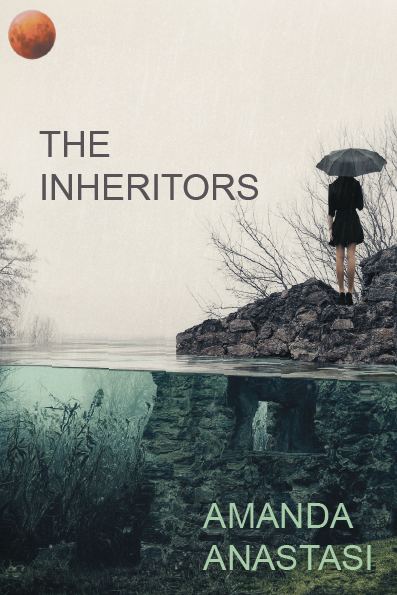|
|
Video Book Description |
||||
| The wildlife
officer moves into the woodland, steps between the crooked carpet of winged limbs; the stiff cloaks swathing brown bodies. He looks out at the row upon row of flying foxes, lifeless or starved to motionlessness; each reduced to lay at the level of a human heel. |
|
The inheritors are those who will suffer the ravages of climate change be they human, creature or plant.
It is a distinct and powerful collection imbued with compassion, anger and prophecy regarding the fate of our planet. These poems are reportage from the precipice - the ferocious terror of bushfire, the sorrow of birdless skies, fish-diminished seas. The reader will encounter unflinching observations and images. Peter Bakowski
Amanda Anastasi here has urgency, wildfire tongue, blistering habitats of lyric. Her words are both whips and soothing balm. She is our cartographer, allowing us to immerse ourselves in the reality of this world while offering up imagined futures. The Inheritors is a critical, visceral and compelling read. Alicia Sometimes
A daring, mesmeric collection. Anastasi weaves her way through these fresh, brave worlds with quiet strength and a careful, exquisite control. A vital and most necessary book from one of our finest. Ian McBryde |
BOOK SAMPLE
Koala Holds Up Traffic
Ineptly, he moves
to the middle road line,
with the tap of claws not made for unyielding
road. He stops
and stares at the benign queue
of delayed four-wheel drives and the drum
of doors as
families emerge from growling engines
to point, coo and exclaim like elated circus punters.
A policeman and
ranger carefully angle and steer him
from the highway and the sounds of photo snaps
and Facebook Live
narrations. Step by languid step,
he is positioned beyond the fog of tar and concrete
for his return to
the retreating forest. The people
re-enter their
cars, turn on playlists and continue.
The Inheritors BOOK LAUNCH

REVIEW
Review
of ‘The Inheritors’
Gemma White
‘You cannot live without what you’ve destroyed’ (47)
The Inheritors opens with the promise of new beginnings, with the poem ‘Newcomer’. Here, Amanda Anastasi describes a child who will experience ‘no freer moment than this’, a freshness of being, of perceiving ‘before / indoctrination begins its sly, steady seep’ (3). So too are described the ‘expectations’ sewn into the child’s birth. But are we talking about the weight of global warming, put off and delegated to future generations? Or are we speaking of the normalcies that form human consciousness, the mental ‘steps that will tread too carefully to invite / epiphany’ (3)?
This need for an inner change of perception or realisation is a theme in Anastasi’s work—it must happen before outer transformation can come. After being flagged in the first poem and continued throughout, it appears most perceptibly in ‘Household Chores’, where we are encouraged to ‘Vacuum up […] niggling doubts’ and to ‘Keep the cobwebs on the walls rather than in your thinking’ (18). In ‘Koala Holds Up Traffic’, a stray koala attracts attention on a road from families in four-wheel drives. After ‘photo snaps / and Facebook Live narrations’, the koala returns ‘to the retreating forest’, while ‘The people / re-enter their cars, turn on playlists and continue’ (6). The word ‘continue’ is telling here. What are the people continuing? Their fog? Or their disconnect, between a chance sighting of a cute koala on the road and the welfare of the ‘retreating forest’ and all its creatures?
In this collection, Anastasi suggests that our current stage of evolution—or devolution—requires constant vigilance against apathy, for while we may be currently ‘assuming permanence’, we must always stay wary of ‘the bell that will end play’, for every one of us is simply a ‘temporary god’ on this earth, a ‘cupped spider’ trapped between the scorching sky and our final resting place, the earth (3). Our ultimate fragility as a human species is laid bare, cutting through our denial with gentle yet precise use of language. Later, in ‘Monostich VI: Prophecies’, the point is put to us more forcefully, in the line ‘The ocean is holding the weight of our apathy’ (55). We are now at a stage where denial is no longer a viable option, as the poet observes, ‘The fence sitter has no choice but to descend the planks’ (54).
There are warning signs to fence-sitting scattered throughout The Inheritors, and these manifest as turning points that perhaps we will never recover from. For instance, in ‘Monostich I: The Turn’, Anastasi writes, ‘The bats are hanging, awake during the day’ (5). The same warning is there in the theme of alienation in the book, which connects to that fog and the one small koala on the road. In ‘Parameters’, the narrator admits they ‘navigate this place / like a temporary lodger’ as ‘this is the closest thing to home’ (7). The rupture between humans and the earth is also expressed in the final monostich of the book: ‘Nature gapes at us, the aliens’ (57).
It must be said that the monostich poems in the collection are extremely well crafted. Their tone brings together a mixture of empathy, care, a documentation of what is and may come and a stark, gentle matter-of-fact voice that never strays into the lands of preaching. These poems are also delivered with exactitude, which, given the vast subject matter of this collection, is no mean feat. Climate change, so potentially and currently devastating in its impacts, is hard to write about because of this, and because it’s so darn important too. But in doing so this book becomes part of that inner change mentioned earlier, in which we see ‘Above the mask, eyes that are rethinking’ (52).
According to Anastasi, we are not just alienated from nature; we are also estranged from other humans. In ‘Summer’:
and agitation at the idea
of human proximity. (43)
Similarly, in ‘Lady Returned’, a future-human refunds a robot companion, for they can’t stand ‘the daily company of remoteness’ that even ‘realistic softness technology’ cannot abate (37). This collection seems to point at something deeply wrong in our psychologies—a reason for all the madness. In ‘After the Flood’, an undertaker notes that ‘It is not the bareness of post-life, but the daily disregard / of the still breathing, that bolts him upright in his sleep’ (36).
I think the power of Anastasi’s collection is that it doesn’t fill in all the gaps, it doesn’t tell you what to think, but rather brings you a collection of facts and fictionalised futures, and says, ‘Here, what are you going to do with that?’ The book is a call to arms, but one that is more effective for being so subtle in acknowledging the complexity of its subject. Anastasi offers a deep understanding of what societal change requires on an individual level. That is what makes this collection so compelling.
You might think, with tragic scenes of ‘flying / foxes, lifeless or starved to motionlessness’ (12), or ‘machines […] making flat newly germinating plants’ (21), that all is lost. But this is not what Anastasi suggests. At different moments, hope is conjured. At one stage, Anastasi pleads for ‘Ideas instead of thoughts. Plans instead of prayers’ (15), demonstrating how a positive, practical and urgent attitude is necessary. The need to work together is highlighted, so we can keep each other honest. She writes, ‘I’ll find room for my hope to rest on yours’, to ‘envisage an alternative present / without the choke in our throats’ (38).
There is one other source of hope, if we can only become quiet enough to hear ‘something akin / to silence: a delicate / hand reaching out, / a pardon, a candid / invitation’ (30). That is, our innate connection to nature, despite our feelings of alienation. We may find this connection when our ego is asleep, ‘when we return to a part / of ourselves we thought we had left behind’ (24). There is such understated beauty in these lines. We are not only monsters, we are also fragile, ugly, vulnerable creatures made of the earth that we now destroy.
Gemma White is a poet living in Melbourne, Australia. Her first collection of poetry, Furniture is Disappearing, was published in 2014 by Interactive Publications. She shares her knowledge of poetry at www.gemmawhite.com.au, where she offers a free 5-day email poetry course. Gemma is currently working on a follow-up manuscript.
Compelling Visions
of the future
Weekend Australian
December
4/5, 2021
There
is no denying (any more at least) the importance of what is known loosely as
"ecopoetry". Amanda Anastasi's second collection, The Inheritors, is an unusually
effective example of the genre. It cleverly manages, for the most part, to
avoid the form's twin dangers: sentimental reductivism or counter-productive
opacity.
All
these poems focus on indicative specifics which imply something much larger.
There is no resort to vague and emotionallydrained abstract nouns or to
watered-down scientific jargon. They "cut to the chase" but they do
not oversimplify. They also obey Emily Dickinson's dictum to tell the truth
''but tell it slant".
steps between the crooked corpses of winged
A
whole colony of fruit bats is dying or is dead already. The officer thinks
about their "label as a pest and rodent", about their role as a
"gothic emblem" and their "replication in plastic". The
poem ends with an image which manages somehow to be both repugnant and
poignant:
Their
slitted eyes are sealed,
their
light bodies swiftly dropped in council rubbish bags,
and
the fingers and ankles bitten by frantic teeth.
Not
all the poems operate at this level; some are more personal and tangential to
Anastasi's main concerns and the book's recurring monostichs (one-line poems,
hard to bring off) are variable in quality- from the clever dystopianism of
"The beachgoers bring blankets and masks" to the more pedestrian
"Nest boxes are strapped to trees".
an especially disturbing observation
Martin
Duwell comments on The Inheritors
The
sense of threat and dis-ease is entirely on the
surface of Amanda Anastasi’s The Inheritors,
whose poems focus specifically on climate change.
Its title provides a clue that its concerns are with
conditions of life for those coming after us: our
children and grandchildren. Its title, of course,
repeats that of William Golding’s novel about the
displacement of the Neandertals by modern humans and
I wondered if this might not be a deliberate
allusion, exploiting in some way that novel’s
tragedy of a declining people faced with a
bewildering change in their circumstances and unable
to adapt to it. On reflection, I doubt if it’s the
case, though, since there is nothing and nobody in
these poems capable of allegorically representing
the new species of that novel.
Anastasi’s book is in two parts: the first part has poems which are set in the present but look forward while those of the second part are usually set sometime in the future. And this is a future whose intricacies the poet obviously enjoys exploring, one whose symptoms vary from messed-up breeding times in Greenland to reality TV programs in which a group of contestants have to survive not the jungle but the streets of Melbourne on a summer’s day.
Books dedicated to poems on a single theme are often ultimately uninteresting because repetition seems more irritating in poetry than it is in any other medium. The Inheritors avoids this by exploring as many ways as possible in which the single theme can be approached. Anastasi has a talent for the gnomic and this produces a series of poems in one-line stanzas which are spread through the book. It’s an attractive form since it blends compression with expansive development. There is also plenty of tonal variation and some poems – “Lady Returned”, whose vision of the future is of one with sex-dolls that ultimately prove unsatisfying, and the imaginary programs of “TV Guide” or the headlines of “2029 News Headlines” – are funny, even if grimly funny.
The framing poem for the first section, and, indeed, the book as a whole, “Newcomer”, makes no reference to the climate crisis. It is about a new baby and the way in which its future development – its initial socialisation and then its reaction against this in later years – can be plotted. But, of course, this baby will become an inheritor and so the subject is broached by omission. There is also a sense of the kind of shadowy dis-ease. . You can see this is in “Parameters”, which describes living in an outer suburb of Melbourne and feeling at odds with the house – “I bump a hand or leg // against the corner of the bedside or kitchen table” – to the point of becoming more like “a temporary lodger”. The first of the poems with single line stanzas, “Monostich I: The Turn”, is interested in those decisive early markers of the onrushing change. Certainly we would expect poets to be sensitive to internally registered markers of change that are missed by most of us. One of the single lines in this poem says:
The people of the sea are moving inland.
To someone who lives a couple of metres above sea level on a sand island, this resonates uncomfortably: an especially disturbing observation.
FOR FULL REVIEW:
http://www.australianpoetryreview.com.au/2021/10/jane-gibian-beneath-the-tree-line/
ISBN 9780648038788
202170pgs
$24.00 Australia


